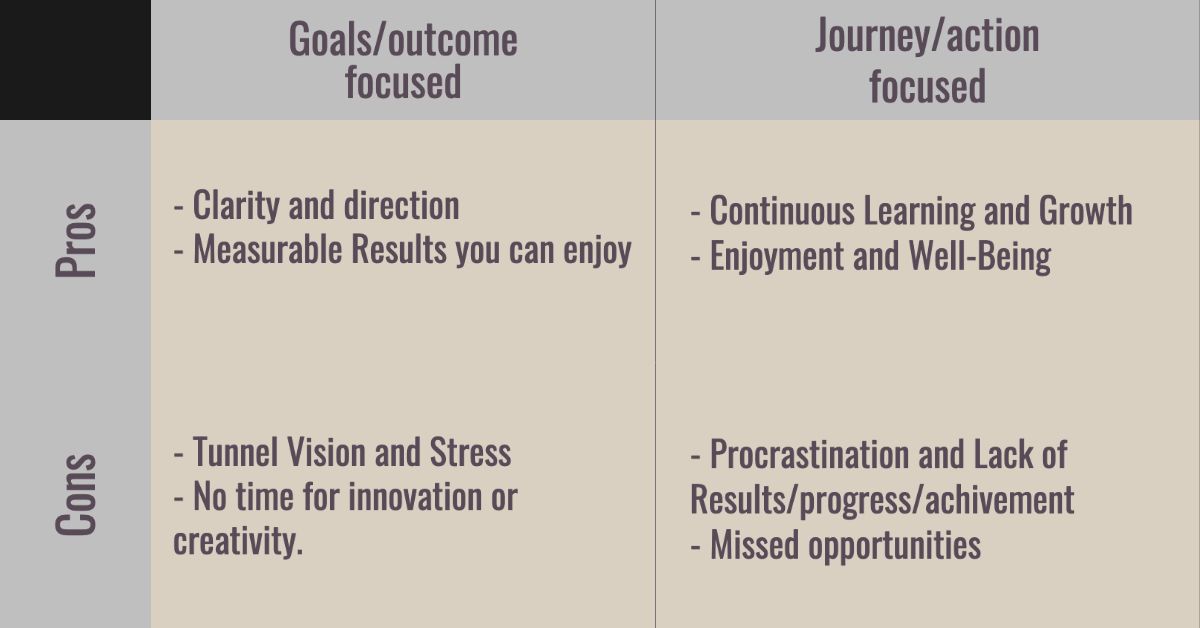Goal or Journey?
"The only limit to your impact is your imagination and commitment."
- Tony Robbins
In the realm of personal and professional development, a perennial debate centers around the importance of goal /outcome orientation versus process/action/journey orientation. What is your preference? have you attained personal and professional success chasing goals or following the process and enjoying the journey?
On one hand, there are those who advocate for setting clear goals and striving relentlessly towards them, believing that the end justifies the means. On the other hand, proponents of process orientation argue that focusing on the journey and following the right process will ultimately lead to desired results.
Most organisations are designed for goal orientations and demonstrating results quarterly. Employees are measured on the outcomes delivered. Tony Robbins, a prominent motivational speaker and life coach, champions the significance of goal orientation. He believes that setting specific, measurable, attainable, relevant, and time-bound (SMART) goals provide a clear direction for individuals to work towards. By setting ambitious goals, Robbins argues, we can tap into our inner resources and unlock our true potential. Goal-oriented individuals tend to be highly focused, driven, and proactive, harnessing their energy towards achieving specific outcomes.
On the other hand, philosophers and various schools of thought emphasize the importance of process orientation. The Stoics, for instance, advocated for cultivating virtues, such as wisdom, courage, and temperance, rather than fixating solely on external goals. According to Stoic principles, by aligning our actions with ethical values and focusing on personal growth, we can find contentment and fulfilment regardless of the outcome. Similarly, the Zen Buddhist philosophy teaches that enlightenment is found in the present moment and in the act of fully immersing oneself in the process, rather than fixating on future goals. One good example is the iconic animator Hayao Miyazaki who created classics like Kiki's Delivery Service, Spirited Away, and My Neighbor Totoro is focused on the process to deliver the best.
Each approach has it's pros and cons as depicted below.

Goal / Outcome Orientation:
Pros:
Clarity and Focus: Provides clear direction and purpose.
Measurable Results: Allows for tracking progress and achievement.
Cons:
Tunnel Vision and Stress: This may lead to neglecting the present moment and increased stress.
Unrealistic Expectations: Setting overly ambitious goals without considering limitations or capabilities. No time for innovation or creativity.
Process Orientation:
Pros:
Continuous Learning and Growth: Emphasizes ongoing development and acquiring new skills. Possibility for innovative solutions.
Enjoyment and Well-Being: Focuses on finding joy and fulfilment in the present moment. Purpose-driven.
Cons:
Lack of Direction: Without specific goals, individuals may struggle to measure progress.
Procrastination and Lack of Results: Excessive focus on the process may lead to a lack of tangible outcomes.
Rather than treating goal orientation and process orientation as conflicting ideologies, it is valuable to recognize that both perspectives have merits. While goal orientation provides a sense of clarity and helps us measure progress, process orientation emphasizes the importance of enjoying the journey and developing valuable skills along the way, empowered by the purpose. Striking a balance between the two can lead to optimal personal and professional growth.
"Don't wait for the perfect moment, take the moment and make it perfect."
- Paulo Coelho
